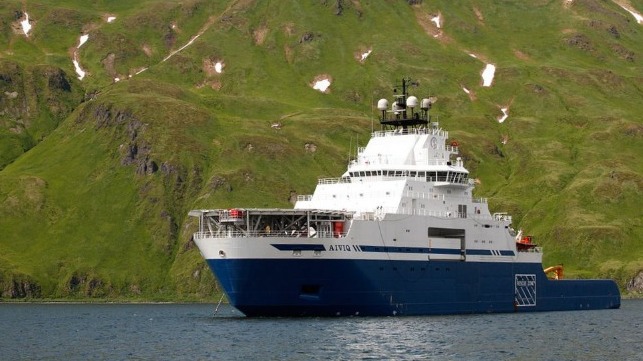Trump Administration May Lease Icebreakers for U.S. Coast Guard

The Trump administration is considering options for leasing one or more foreign-built commercial icebreakers for use by the U.S. Coast Guard, according to Senator Dan Sullivan (R-AK), who discussed lease options at a hearing of the Sennate Commerce Security subcomittee on Tuesday. The U.S. Coast Guard medium icebreaker Healy recently suffered a propulsion casualty, leaving the service with just one oceangoing icebreaker - the 44-year-old Polar Star, which is currently on her way to patrol the Bering Sea.
"I just talked to the National Security Advisor [White House National Security Advisor Robert C. O'Brien], I know there are icebreakers being looked at in Finland," said Sen. Sullivan, speaking to USCG Vice Commandant Adm. Charles Ray. "These are medium icebreakers that would essentially bridge the gap that we recognize we have. My understanding is the White House, the National Security Advisor, possibly the Navy with some of their money . . . are looking at moving forward with leases soon, maybe as early as the end of this month."
Sullivan also mentioned a possible vessel option under discussion in Florida, an unusual location for an icebreaker. The Edison Chouest-operated icebreaker Aiviq - which has been proposed as an option for the U.S. Coast Guard in years past - is presently moored in Tampa. Both the U.S. Coast Guard and the Canadian Coast Guard have previously declined to acquire Aiviq.
In response, Adm. Ray said that the U.S. Coast Guard has explored the possibility of leasing civilian icebreakers, and that it was a possibility - so long as it was a temporary measure, not a replacement for an American-made, purpose-built Coast Guard vessel. "There is a potential that one of those vessels could be of benefit to use as a 'bridge' [for capability]," Adm. Ray said.
Sen. Sullivan (R-AK) raised the prospect of homeporting a leased icebreaker in Alaska, and preferably at an Alaskan port closer to the Arctic - not in Seattle, where the USCG icebreaker fleet is currently based, or in Dutch Harbor or Kodiak. "It seems to me to be a strategic no-brainer," said Sullivan. "Seattle is a couple thousand miles away from the Bering Strait and the Arctic Circle."

that matters most
Get the latest maritime news delivered to your inbox daily.
The recent large-scale Russian exercise in the Bering Sea - which resulted in a run-in between American fishermen and Russian military assets - has brought wider attention to the Coast Guard's patrol and presence role in Arctic waters. Sullivan pressed Ray on the recent encounter and on how a repeat might be prevented. "Our fishermen should never in my view be forced out of the American EEZ when they're legally fishing," he said. "What do you think happened that we can improve on?"
"The activity of the Russians in planning and executing that exercise, I think there was a degree of irresponsibility there that needs to be addressed and we've done that," responded Adm. Ray. In addition, the electronic notice for this particular Russian exercise did not get flagged and highlighted for American fishermen by the Coast Guard, which could have provided fishing vessels that did not obtain the information on their own with an extra warning, he said.
